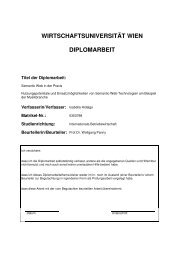Wirtschaftsuniversität Wien Magisterarbeit - SemanticLab
Wirtschaftsuniversität Wien Magisterarbeit - SemanticLab
Wirtschaftsuniversität Wien Magisterarbeit - SemanticLab
You also want an ePaper? Increase the reach of your titles
YUMPU automatically turns print PDFs into web optimized ePapers that Google loves.
data can be found over search engines such as Google, Yahoo! or MSN? Of course, most<br />
platforms provide privacy settings to hinder web-crawlers to index such information and<br />
prohibit other users of such platforms to access it without prior consent of the owner.<br />
However, studies show that most users do not know about such issues and platform<br />
providers do not necessarily have the most stringent privacy settings in place by default<br />
[Jon05]. A lot of web users “[...] are posting content online without thinking about the<br />
electronic footprint they leave behind” [Gua07] which can have severe consequences in<br />
the future - think about employers “googleing” you before inviting you to a job interview<br />
or parents taking a look at the latest party pictures of their children.<br />
Methods such as “profiling” and “tracking” enable search engines, web shops and other<br />
companies to create user profiles [Awa06]. With such user profiles, all kind of preferences<br />
of users can be found out and certain conclusions can be drawn. If a user at amazon.com<br />
for example is mainly searching for English science fiction books on Saturday nights,<br />
amazon.com (or their algorithms, respectively) could come to the following conclusions:<br />
• The best way to make sure the advertising on the website has a high conversion<br />
rate is to show advertisements to the user which are related to science fiction<br />
• There will be a higher chance of selling the user another book if it is similar to the<br />
books which were sought for<br />
• The user may not have a lot of social life because he is regularly searching for<br />
books on a Saturday evening<br />
Although the last conclusion may seem a little bit far out, search engines are able to<br />
collect and connect millions of user profiles. Privacy scandals such as AOL’s publication<br />
of search queries plainly show us how much personal information such companies can<br />
generate by connecting information: although the data of AOL was anonymized, everyone<br />
with access to the Internet was able to find out that “AOL user 311045 apparently<br />
owns a Scion XB automobile in need of new brake pads that is in the process of being<br />
upgraded with performance oil filters” or that AOL user 005315 “searched for information<br />
about prison inmates, gang members, sociopaths in relationships, and women who<br />
were murdered in southern California last year” [CNT06]. In a very dramatical way,<br />
such examples highlight the need for privacy on the Internet and the need for ways to<br />
make privacy policies easy to understand for (unexperienced) web users.<br />
1.2. Research question<br />
The thesis addresses the question of how Internet users can make sure that their data is<br />
only used with their knowledge for the purposes they know and approve of. To answer<br />
this question, threats to privacy when browsing the web have to be discussed as well as<br />
common web privacy standards.<br />
The topic of this thesis also specifies a certain need for an applied point of view. For<br />
that reason, requirements for web privacy tools are going to be introduced and such<br />
tools will be evaluated considering these requirements.<br />
3





